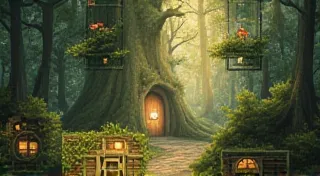Unlocking Imagination: A Beginner's Guide to Creative Writing Prompts
Writer's block. Those two words can strike fear into the heart of even the most seasoned creative writer. Staring at a blank page, the cursor blinking mockingly, feeling utterly devoid of ideas – it’s a universal experience. Fortunately, there's a powerful tool available to combat this: creative writing prompts. This guide explores how prompts can unlock your imagination, overcome writer's block, and jumpstart your writing journey.
Why Use Writing Prompts?
Prompts aren’t just for beginners. They serve as a springboard, offering a starting point when inspiration is lacking. They can help you:
- Break free from routine: Prompts push you outside your comfort zone and encourage experimentation.
- Spark new ideas: Even a seemingly simple prompt can trigger a cascade of story possibilities.
- Practice different genres: Prompts can be tailored to specific genres, helping you broaden your writing skills.
- Overcome fear of the blank page: A prompt provides a defined starting point, reducing the overwhelm.
Types of Creative Writing Prompts
Prompts come in various forms, each catering to different writing styles and preferences. Here are a few common types:
- Character Prompts: Focus on creating a character and exploring their personality, backstory, and motivations. Example: "Write about a character who discovers they can communicate with animals."
- Setting Prompts: Focus on describing a location and building a story around it. Example: "Describe a bustling marketplace on an alien planet."
- Situation Prompts: Present a scenario or conflict that your character must navigate. Example: "A locked box is delivered to your doorstep. What's inside?"
- Image Prompts: Use a picture as inspiration for your story. (See image prompt example below).
- ‘What If…?’ Prompts: Pose a hypothetical situation and explore its potential consequences. Example: "What if gravity suddenly reversed?"
- Dialogue Prompts: Provide a snippet of dialogue and build a story around it. Example: “’I never thought I’d see you here,’ she said, her voice tight with…”
Let’s see how prompts can be adapted for different genres:
- Fantasy: “A magical artifact grants you a single wish, but it comes with an unexpected consequence.”
- Science Fiction: “You wake up on a spaceship with no memory of who you are or how you got there.”
- Mystery: “A valuable painting disappears from a locked room. Write about the investigation.”
- Romance: "Two strangers are forced to work together on a project. What sparks between them?”
- Horror: “A strange noise keeps you awake at night. You investigate and discover…”
The Emotional Landscape of a Prompt
The most compelling stories often arise not just from a simple premise, but from the emotional core the prompt evokes. Consider the feeling of loneliness in a ‘What If…’ prompt that asks, “What if you were the last person on Earth?” Or the underlying sense of hope and resilience within a character prompt like, “Write about a character who rediscovers a lost passion.” Understanding this emotional undercurrent allows you to infuse your writing with depth and resonance.
Interpreting Prompts: Making Them Your Own
The beauty of prompts is that they’re open to interpretation. Don't feel confined to a literal reading. Here are some tips:
- Ask 'Why?': If a prompt seems simplistic, ask yourself *why* that particular element is presented.
- Twist the Prompt: Subvert expectations. Take the prompt in a completely unexpected direction. Sometimes, the most memorable stories come from flipping a prompt on its head.
- Combine Prompts: Mix and match elements from different prompts to create something unique. Try blending a setting prompt – "A hidden garden overgrown with exotic plants" – with a character prompt – "A retired thief seeking redemption."
- Focus on Emotion: Consider the emotions the prompt evokes and explore them in your writing.
- Don't be afraid to abandon it: If a prompt just isn't working, move on! There are plenty more.
Beyond the Prompt: A Deep Dive into Story Development
A prompt is just the starting point. Once you have a basic idea, consider these aspects, pushing beyond the immediate spark to construct a robust narrative:
- Character Development: Give your characters depth and complexity. Consider their flaws, motivations, and backstories – even those that don’t directly influence the prompt’s immediate situation. If you’re struggling to create compelling characters, exploring the nuances of human connection – as investigated in articles like "The Gardener of Unsent Letters: Cultivating Empathy Through Character" – can be invaluable.
- Plot Structure: Create a clear beginning, middle, and end. Think about rising action, climax, and resolution.
- Worldbuilding: (For fantasy and science fiction) Develop a believable and immersive world. Consider the culture, history, and environment of your setting.
- Theme: Explore a deeper meaning or message through your story. What do you want your readers to take away from your writing?
- Narrative Voice: Experiment with different points of view and narrative styles to find what best suits your story.
- Show, Don't Tell: Engage your readers by vividly describing scenes and actions, rather than simply stating facts.

Navigating Narrative Challenges
Even with a well-crafted prompt and a solid plan, the writing process can be challenging. Writer's block, self-doubt, and the fear of failure are common hurdles. Remember that every writer faces these struggles at some point. Don't be afraid to seek feedback, experiment with new techniques, and most importantly, persevere. Understanding how writers have tackled similar challenges, as detailed in explorations of narrative desertion, as found in "The Cartographer of Lost Stories: Navigating Narrative Desertion", can offer vital insights and strategies.
Refining Your Craft: From Draft to Publication
Once you’ve completed your first draft, the work isn’t over. Revision and editing are crucial steps in the writing process. Pay attention to grammar, punctuation, and clarity. Consider seeking feedback from other writers or editors. If you're ready to share your work with a wider audience, researching publishing options and understanding the complexities of the literary landscape is essential. Resources focusing on the journey from initial draft to published work, such as "From Draft to Done: Essential Publishing Tips for Creative Writers," provide guidance on navigating the often-complex world of publishing.
Embrace the Journey
Creative writing prompts are a powerful tool for any writer, regardless of experience level. Don’t be afraid to experiment, take risks, and most importantly, have fun! Happy writing!





